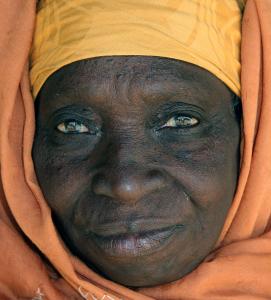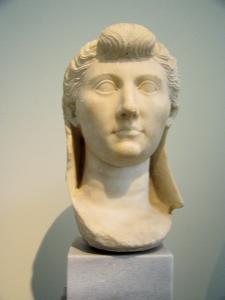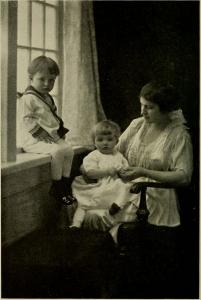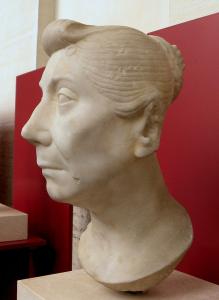 As a man, I am treading on rather thin ice as I approach this infamous passage from the book of Proverbs. My NRSV titles this lection, “Ode to a Capable Wife,” a heading that could be seen as offensive in several ways. It should of course first be said that the italicized headings found in any Bible one picks up were not written by biblical authors but rather by the translators of this particular rendering of the ancient texts, so some modern person—perhaps a male?—found this title appropriate.
As a man, I am treading on rather thin ice as I approach this infamous passage from the book of Proverbs. My NRSV titles this lection, “Ode to a Capable Wife,” a heading that could be seen as offensive in several ways. It should of course first be said that the italicized headings found in any Bible one picks up were not written by biblical authors but rather by the translators of this particular rendering of the ancient texts, so some modern person—perhaps a male?—found this title appropriate.
Whoever penned this title has, I think, run afoul of the very first descriptor used to designate the quality of this extraordinary woman. The reading “capable” does not begin to capture the rich meaning of the Hebrew chayil. A glance at the book of Ruth can clarify the wider meanings of this particular locution. At Ruth 2:1, Boaz, Ruth’s eventual husband, is called an ‘ish chayil, translated rather too fulsomely in NRSV as “a prominent rich man.” But later at 3:11 on the threshing floor at midnight where Ruth has insinuated herself next to Boaz and his heaping grain pile, he names her “ishah chayilah.” The translation here can hardly be “prominent and rich,” since Ruth is hardly a woman of any means. So here the NRSV chooses “woman of worth,” which is not wrong necessarily, but I think suffers from an inability to see what the ancient author is actually saying. By using the identical phrase, the former in the masculine gender, the latter in the feminine, what we are being told is that Boaz and Ruth are fully equal characters, both extraordinarily worthy individuals and judged so by all of the community, as Boaz says directly at 3:11 when he tells her, “all the assembly of my people know you are ‘ishah chayilah.’”
This is a rather long argument to say that “capable” is not the best reading of the adjective in question. This wife in Proverbs is prominent and worthy, and is recognized as such by any who see her. And as we read what this woman does, “capable” seems laughingly inadequate as a useful description of her vast worth to her husband and her family. Little wonder that she is first said to be “far more precious than jewels” (Prov.31:10b). And “the heart of her husband trusts her,” because “he will lack no gain” due to her fully engaged work for him and the family (Prov.31:11). Remember that “heart” in Hebrew anthropology refers to will and intelligence, and not to emotion. In full rationality, the husband can trust his wife to act for him in ways that ensure growth and esteem for him. In short, as we saw in the relationship between Boaz and Ruth, the husband and wife of Proverbs are completely equal in their value in the family. Thus, one should be careful when making too easy generalizations about complete male dominance in ancient Israel. It cannot be denied that men had the upper hand in most things, and women were too often second-class citizens. But here, and in other biblical texts a genuine equality is suggested. This reality again points to the inadequacy of the NRSV translation of “capable.” In her activity, now described in rich detail, she is a worthy partner of her husband. Indeed, after cataloguing her astonishing daily toil, it is difficult to imagine just what the husband does in the workings of the family home!
Just listen to the exhausting and comprehensive catalogue of the wife’s activity. She “seeks wool and flax and spins (creates) with willing hands” (31:13); she resembles “merchant ships,” bringing “food from far away” (31:14); she “rises while it is still dark, providing food for the household” and charges the servant girls with their tasks” (31:15); she “surveys a field and buys it; with the fruit of her hands she plants a vineyard” (31:16). Note the activity here: it is the wife who chooses property, using cash from her own labor to purchase it, and then choosing to plant on her new land a vineyard, the ultimate money-making crop of the ancient world. “She observes that her merchandise is profitable, and does not allow her lamp to go out even at night” (31:18).
Beyond her tremendous economic skills, she is not only concerned to make herself and her family richer and more comfortable, but “she opens her hand to the poor, reaching her own hands out to the needy” (31:20). This woman does more than write a check for the local charity; she herself “reaches out her hands” to bring aid where it is needed. “She does not fear when the snows come to her household, because all of them are clothed in crimson” (31:21) no doubt due to her foresight and hard and continuous labor for them. Still, she does not neglect her own needs; “she makes coverings for herself; her clothing is fine purple linen” (31:22). Purple clothing is only possible if one has access to the fabled purple dye of the Mediterranean mollusk, a rare and delightful color, often reserved for royalty and nobility.
Yet, this woman is far from content with her own fabulous garments; “she makes linen garments and sells them, and supplies the merchant with (special) sashes” (31:24). It must finally be said of her that her distinctive clothing is not what characterizes her as a worthy in the community, for “strength and dignity are her clothing, and she laughs at the future” (31:25), knowing she has all things well in hand. Yes, this woman “opens her mouth with wisdom, and the lesson of unbreakable love is on her tongue” (31:26). With all of her superb skills ate organizing and creating and shaping her household, the real gifts of this amazing woman is the fact that wisdom is always pouring out of her and, even more,chesed, that thing that best characterizes YHWH’s connection to Israel, is forever her hallmark quality.
Little wonder that “her children rise up and name her blessed and happy (the Hebrew means both things at once), and her husband too praises her” (31:28). 31:29 may be the words of the husband’s praise, “Many women have done worthy things (that word chayil again), but you outstrip them all.” The poet summarizes the woman’s portrait by saying, “Charm is a lie, and beauty is empty; while a woman who is in awe of YHWH is to be praised” (31:30).
So there we have the astonishingly worthy and prominent woman, a picture that has both amazed and goaded women ever since, many of whom have tried to be this woman. And her husband? All that we know of him is that “he is known in the city gates, taking his seat among the elders of the land” (31:23). He is of course able to do this because his wife is taking care of all the family business from before dawn until late at night! Like Tevye in “Fiddler on the Roof,” he merely wants to study Torah by the eastern wall “seven hours every day.” But with this wife, the husband is apparently able to do just that!
Just what are we to do with this incredible woman? Rather than assume that she is some sort of model for all women, an idea that is absurd on its face, perhaps we should keep her in her ancient context and see her for what she is, namely a woman worthy and the equal of any man. Even in that time of male dominance, this portrait of a woman was a valued and memorable one. The entire poem is an acrostic; that is, each sentence begins with a new letter of the Hebrew alphabet in order, from aleph to tau. That implies that this poem was to be remembered and repeated, passed down from age to age, announcing that women were the equals of any man. And don’t you forget it! In our own time, when women still make about 75% of what men make for the same work, when men still think they can control women, both verbally and physically, this memorable picture of the Proverbs woman remains distinctly valuable and important.
(Images from Wikimedia Commons)











